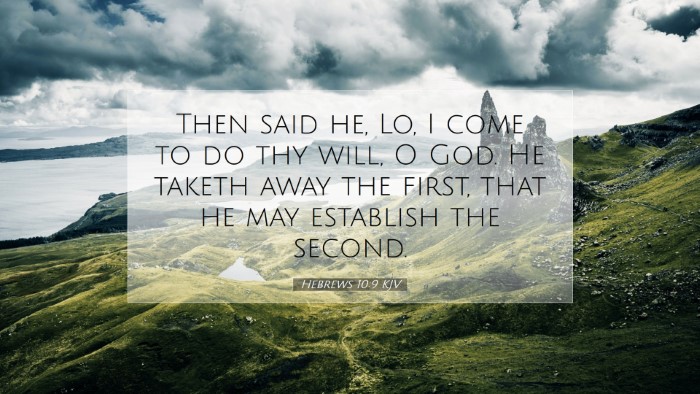Commentary on Hebrews 10:9
Verse: "Then said I, Lo, I come to do thy will, O God." - Hebrews 10:9 (KJV)
Introduction
This verse encapsulates the essence of Christ’s mission in coming into the world, emphasizing His obedience to the divine will. Scholars and theologians have long regarded this statement as pivotal in understanding the relationship between the Old and New Covenants.
Contextual Analysis
The author of Hebrews quotes from Psalm 40:6-8, linking the sacrificial system of the Old Testament with the ultimate sacrifice of Christ. This transition from ritual to relationship is crucial for comprehending the theological implications of Christ's coming.
Theological Significance
-
Divine Initiative:
Christ's coming is portrayed as a response to God's will rather than an arbitrary act. This highlights that salvation stems from God’s initiative, underscoring His sovereignty in salvation history.
-
Fulfillment of the Law:
Matthew Henry notes that Christ embodies the law's fulfillment, showing that His life and sacrifice supersede the animal sacrifices which were but shadows of what was to come.
-
Obedience as Central Theme:
Albert Barnes emphasizes the significance of obedience in the life of Christ. His willingness to submit to God’s will serves as a model for Christian conduct.
-
Replacement of Rituals:
Adam Clarke explains that this verse symbolizes the transition from the old sacrifices to the new covenant in Christ's blood, signifying the end of an era where the ordinary and often flawed sacrifices were used for atonement.
Exegesis of the Text
The phrase "Lo, I come" reflects a readiness and eagerness to undertake God's will. This reflects the heart of Christ who has willingly chosen to fulfill what the Father has ordained. The verb tense indicates that this is a completed determination, illustrating Christ’s commitment to His mission.
Christ's Willingness
The declaration of coming to do God’s will serves as a significant contrast to the mechanical nature of religious sacrifices. Jesus desires obedience over sacrifice, which references back to the Old Testament directive (1 Samuel 15:22). Matthew Henry notes that the essence of worship is not merely in sacrifices but in the heart’s disposition to obey God.
Implications for Believers
-
Call to Obedience:
Believers are urged to respond to God’s will with the same readiness exhibited by Christ. This positioning exemplifies a life lived in accordance with divine purposes.
-
Rejection of Empty Rituals:
Church traditions that prioritize ritual without relational engagement fall short of God’s intent as noted by Clarke. Spiritual authenticity is paramount.
-
Motivation for Service:
Understanding Christ's obedience equips followers for sacrificial living, prompting an examination of personal motivations in service to others and to God.
The Contrast of Old and New
This verse serves as a pivotal point in contrasting the old covenant, which relied heavily on ritual sacrifice, with the new covenant that emphasizes a personal relationship with God through Christ. The various commentators highlight how Christ's sacrifice is not merely an addition to the sacrificial system but a transformative replacement.
Conclusion
Hebrews 10:9 is a profound statement of Christ's mission and a clarion call for believers to consider their own response to God's will. Through His obedience, Jesus sets a standard for human behavior that is rooted in love, submission, and purpose. As pastors, students, and theologians engage with this text, they are reminded of the overarching narrative of redemption where the willingness to fulfill God's will becomes central to both Christ's life and the believer's response.


